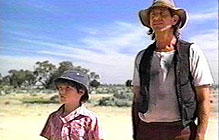|
|
|
|
That
Eye, the Sky
|
 |
|
John Ruane's That Eye, the Sky is an unusual entry into the annals of Australian cinema. It takes on grand spiritual themes – belief, redemption, divine intervention – in a questioning, somewhat troubled way. The laconic, knockabout, roundly sceptical aspects of our national art and culture – which Ruane has previously excelled in expressing in Death in Brunswick (1991) – suddenly confront the elevated art-cinema visions of Carl Dreyer, and the magic realism of much modern literature. It is undoubtedly Tim Winton – from whose novel the film is adapted – who allows this salutary rapprochement of extremes. That Eye, the Sky tells the story of a family that seems virtually alone in an outback wilderness. Cheerful Aussie casualness is quickly overtaken by a morbid, Gothic mood familiar from plays by Tennessee Williams or Sam Shepard. Signs of illness, death, madness and sexual frustration are everywhere. After a car accident, Sam (Mark Fairall), the father of this clan, falls into a deep coma. Like his dotty mother (Alethea McGrath), Sam becomes a burden to the household. His wife Alice (Lisa Harrow), teenage daughter Tegwyn (Amanda Douge) and young son Ort (Jamie Croft) struggle on with their soul-destroying predicament. Everyone seems under the weight of a cosmic malaise. Into this dank world Henry (Peter Coyote), a mysterious American stranger, appears. Smooth-talking Americans typically figure in outback movies (such as The Coca-Cola Kid [1985] or Razorback [1984]) as slimy con-men, and Henry certainly carries this taint. But he eventually reveals himself as an evangelist, albeit a somewhat tortured and ambivalent one. The film maintains its scepticism towards Henry's words and actions – hinting that he may simply be an opportunistic sleazebag. But it simultaneously asks us to consider seriously the religious themes that he introduces. And here the focus moves from Henry to little Ort, with his heavenly visions and strange powers. Ort is either a divine vessel, or just another Aussie ratbag in the making. The film moves towards a conclusion that is surprising, confronting and genuinely affecting. Ort's final voice-over reflection that ''something in this world is gonna break'' has a rousing, grandiloquent ring, as if somehow the fate of this one family symbolises the spiritual fate of the entire globe. Even after two viewings, I find this an elusive, meandering, sullen film. It seems less enigmatic than simply half-baked. It vacillates between two starkly different modes – a de-dramatised, free-floating, art-cinema mode, and a more vigorous psychological mystery mode in the vein of some recent American thrillers. The film is least at ease when it wanders into frankly Spielbergian territory. Hidden somewhere inside the film is a fascinating depiction of masculinity – perhaps the characteristic Winton brew of timeless Christian mythology and more contemporary Sensitive New Age Guy concerns. All of the men in the story (including Ort) have at some time suffered comas or seizures – as if possessed by some mystical ritual of death and rebirth. Many unsubtle references to the crucified Jesus make this connection. But why should these modern blokes undergo such painful resurrections? There is a strong hint underlying proceedings that the male propensity for violence – perhaps even masculine sexuality itself – is a kind of Original Sin from which these characters need urgent release. With such an emphasis on the male predicament, it is perhaps not surprising that the female characters are rather pale by comparison. It is implied that Alice and Tegwyn are embroiled in a tug-of-war of desire over Henry. But the film shies away from this earthy theme, perhaps out of some obscure moral compunction. For all the intriguing possibilities in its script, this is a film whose threads are never drawn together in any compelling way. Ruane's direction registers as half-hearted in many areas. The very restrained shooting style fails to enliven scenes, despite Ellery Ryan's finely textured cinematography. Coyote – an actor who wanders the world appearing in odd art-films such as Almodóvar's Kika (1993) – is far too distanced from his role to be effective. Jamie Croft makes a valiant effort in the difficult and demanding leading part. But Ort, as conceived by the filmmakers, is one of those over-idealised, angelic children familiar from Wim Wenders' movies – ranting about goodness and other improbable subjects. Only when Ort is allowed to let rip with an occasional ''up your bum!'' does the film ever connect with its audience in a real way. MORE Ruane: Dead Letter Office © Adrian Martin September 1995 |
![]()